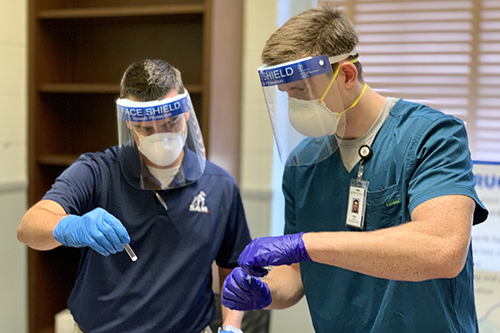
Faculty in Samford University’s McWhorter School of Pharmacy have assumed leadership of a new clinic, expanding the university’s COVID-19 testing with students and employees.
While GuideSafe will continue to partner with Samford for random sentinel COVID-19 testing, this new, on-campus clinic will supply focused testing. This process sorts positive cases on campus into groups based on common factors, like an event or a specific location. Once identified, the clinic will test others associated with these groups, working to detect cases where individuals are positive but asymptomatic or have minor symptoms that may be difficult to recognize.
The clinic is under the leadership of Michael Crouch, associate provost of Samford’s College of Health Sciences and dean of McWhorter School of Pharmacy. He also serves as the co-chair of the university’s Continuity of Instruction Taskforce.
“This is an important component of a comprehensive testing program, and it includes testing COVID-19 hotspots to help monitor the health of our students, faculty and staff,” he said. “I’m thankful to the faculty members and pharmacy students who answered the call to serve when the need for a testing clinic was identified.”
The clinic is currently opened three days a week, and McWhorter School of Pharmacy faculty members Dee Dugan and Roger Lander oversee the lab. The lab is working under a school-based Clinical Laboratory Improvement Amendments (CLIA) waiver and under guidance of the Alabama Board of Pharmacy.
The testing platform is an antigen test, chosen for its reliability and speed. “The whole test takes 15-20 minutes. Students and employees leave the clinic knowing their results,” said Dugan. “The antigen test is known for identifying cases early, which is our ultimate goal.”
With each clinic day, Dugan and Lander are supported by three Doctor of Pharmacy students who are volunteering their time and gaining valuable experience. Pharmacy students walk each patient through the process of collecting a sample—safeguarding the safety of everyone involved—and providing counseling on test results. The entire clinical team wears full personal protective equipment and disinfects surfaces regularly.
“Our testing process is comparable to what you would see in certified private labs. It’s all done by proper lab procedure,” Lander said. “Because of this, our students are learning so much through this experience.”
“We all went through training, including the students, to learn the procedure of the antigen testing,” Dugan continued. “But with our students, we also emphasized the basics that are so important—like how to properly remove gloves and how to make sure your N95 mask fits properly.”
This learning experience, Crouch explains, is truly extraordinary as it further emphasizes the important connection between pharmacy and public health.
“Pharmacists—working alongside other health care providers—are helping to address this public health emergency. A pharmacist-run COVID-19 testing lab is another way to serve our community. Pharmacists can give vaccinations in all 50 states, and they will be part of the eventual COVID-19 vaccination program. It’s important pharmacy students see this now and understand the impact they will have when they graduate,” he said.
